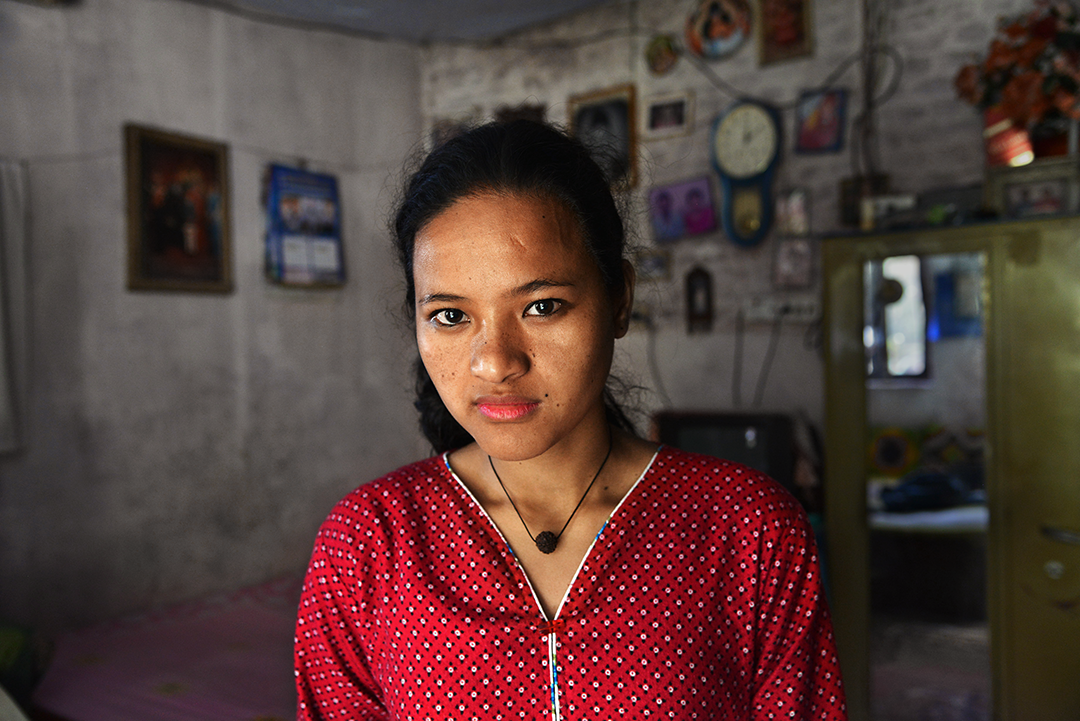The scar on Saraswati’s forehead and the one on her knee are all she has to show for years of abuse she endured as a domestic worker, first with a family in her eastern Nepal village and then in Kathmandu. The scars may be small and her knee may only ache in cold weather, but her mirrored reflection is never without the reminder of how cruel some people can be. She began domestic work when she was 12, following in the sweeping steps of her mother, sisters and a brother. Because of the abuse she experienced, Saraswati, who still works as a domestic worker with a family in Kathmandu but is finishing her education through a non-formal programme, now helps other domestic workers learn they have rights.

“After my father died, my sisters were all working as domestic workers. My mother was a domestic worker but returned home at night. She also was an alcoholic, and we had problems. We often didn’t have enough to eat. My mother’s employer paid at the end of the month. We’d buy rice then but that would run out.
“I used to go with my mother to the house where she worked. The mother of that family said, ‘Since you have such a difficult time, it is better that you work.’ So she found me work at her relative’s place. I slept on the floor on a carpet. It was not comfortable. They didn’t pay me. When my mother was ill, we asked for money, and it was the only time they gave. I was only given shelter. After they ate, I would eat. Sometimes it was enough, sometimes not. When the food was not enough, there was nothing I could do about it.”
As a child, I made mistakes
“Because I was a child, I made mistakes. Like things might get broken or I might go out and play and the work was not finished on time. They started scolding me. They would shout, sometimes pull my hair and sometimes beat me. In the beginning I was thinking that the situation at home is not that great, so I tried to stick it out. But I couldn’t take it anymore. I ran home.
“The employers came to my house to take me back. I had told my mother I was beaten. The employers said it would not happen again and that they hadn’t actually beaten me but that I fell down and I was making it up. My employer said, ‘She’s just like our daughter, so we scold her sometimes—that will happen.’ My mother believed them and I was taken back.
“I was taking a cup of tea to the grandmother that I dropped. The cup broke and the hot tea spilled on her foot so she hit me on the forehead with her cane and it was bleeding. It was serious because it was dented. The stick was made of iron. She only hit me once, but it was bleeding badly. I went to the hospital to get it treated. Later, a family in a local pharmacy helped me to leave. They gave me a ticket to Kathmandu.
“In Kathmandu, I worked for a Marwari family of Indian origin; they were businesspeople. I had to wake at 4 in the morning. It was a lot of work and they shouted a lot. They were very fussy on how they wanted the work done. It was a seven-member family. A lot of guests used to come and I had to give them tea. One day I brought tea, but the owner didn’t see me. When she reached out, she put her hand in the hot tea. After the guest left, she took me to my room and started beating me with her hand and pulling my hair. With no one at home to stop her, she would beat me a long time. In Kathmandu I was beaten more than by the grandmother in my village.”
Where the abuse was the worst
“The abuse was the worst in the first home because I had to put up with it for so long. There were more beatings and more shouting in the second place, but I had this feeling I could go somewhere else if I wanted.
“In my school, I know others who work under the same conditions. Next year I will get my school-leaving certificate. It is non-formal schooling. I don’t think that people usually treat workers like this. It might have been because I didn’t work properly that I was beaten, I don’t know. They had two sons, 10 years old and 8 years. They wouldn’t beat them. If they were naughty, they would get shouted at. Even if they do keep domestic workers, especially children, the children should be given benefits equal to other children. They should be sent for proper education, allowed to go out and enjoy festivals and be given proper shelter.”
Employers should do some of the work
“When I was beaten, I did not feel it was right even at that time. But they were adults, and there was no way I could tell them that they were wrong. The government should not allow children to be used as domestic workers, and second, the guardians (parents or whoever) should be aware that they should not send their children to do such work. The employers should be willing to do some of the work.”
